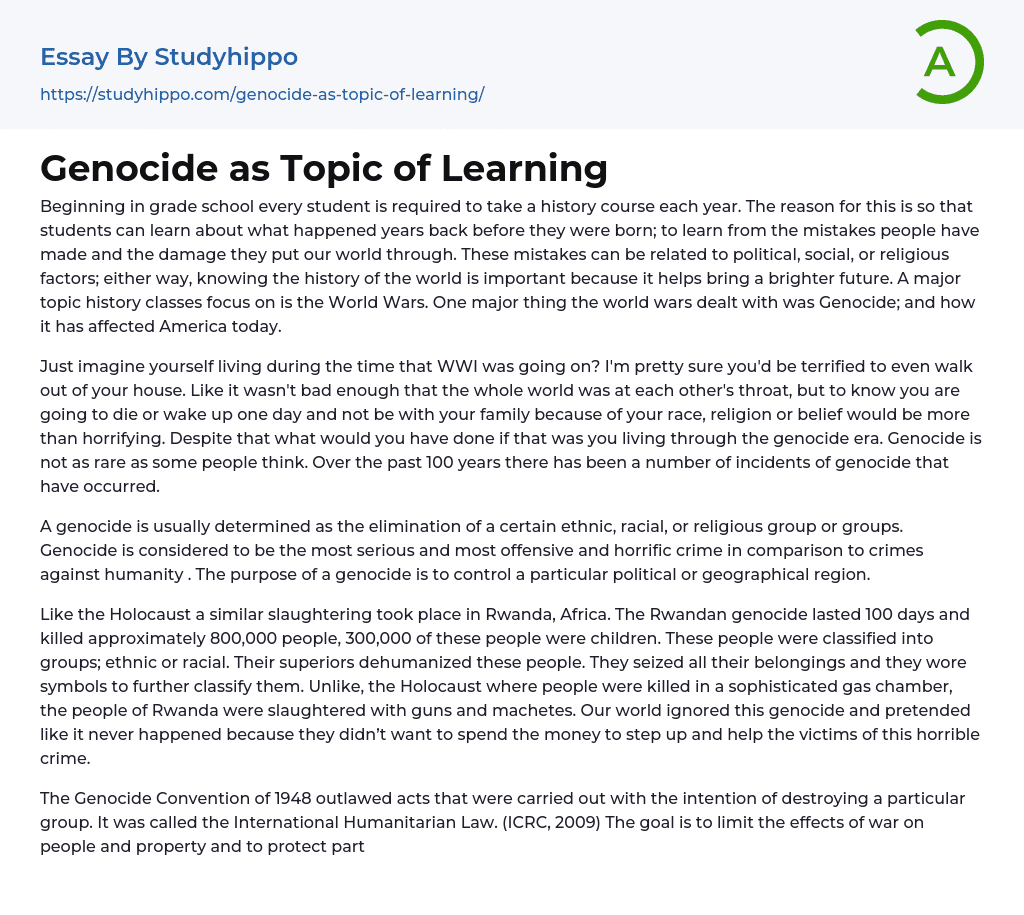It is mandatory for grade school students to attend history class annually. The purpose is to educate them about past mistakes and how they have influenced society, encompassing political, social, and religious aspects. Acquiring knowledge of world history holds significance in shaping a brighter future. Among the crucial subjects covered in history classes are the World Wars.
The world wars were greatly impacted by genocide, with long-lasting effects on America today. It is difficult to envision the experience of living during WWI, where leaving one's home would be paralyzing due to fear. The entire world was at war and the realization that one's race, religion, or beliefs could result in death or separation from family was horrifying. However, despite these terrifying circumstances, how would one have coped with surviving such a genocidal era? Genocide is more prevalent than commonly perceived, with numerous incidents occurring
...throughout the past century.
A genocide is an intentional act targeting the elimination of a particular ethnic, racial, or religious group. It is considered the most extreme and abhorrent crime, surpassing crimes against humanity. Its aim is to assert control over a specific political or geographical area. Like the Holocaust, Rwanda in Africa witnessed a similar large-scale massacre. Spanning 100 days, approximately 800,000 individuals lost their lives during the Rwandan genocide, including 300,000 children. The victims were classified based on their ethnicity or race.
The people in Rwanda endured dehumanization as their superiors confiscated their possessions and identified them using symbols. In contrast to the sophisticated gas chamber system utilized during the Holocaust, guns and machetes were utilized to massacre victims throughout the Rwandan genocide. Unfortunately, the global community chose to disregard this genocid
and deny its occurrence due to a reluctance to allocate funds for aiding the victims of this horrendous crime.
The 1948 Genocide Convention, also known as the International Humanitarian Law, prohibits actions that seek to exterminate particular groups. Its goal is to reduce the effects of war on individuals and assets and protect those who are vulnerable. Humanitarianism focuses on valuing human well-being above all else. However, despite these humanitarian principles, neither the United States nor any other nation intervened in Rwanda. If the international community had taken action, it could have potentially limited the extent of the Rwandan genocide and thereby reduced the number of deaths.
The United Nations plays a crucial role in preventing atrocities like genocides by providing accurate information and assistance. If Western nations had acted promptly and made correct choices, they could have prevented the devastating Rwandan genocide, which resulted in the loss of 800,000 lives. The negligence and lack of concern shown by these powers had serious consequences. Americans prioritized saving money, Belgians were more concerned about their reputation, and the French sought to protect their ally. The Rwandan genocide is not only a tragedy within Rwanda's history but also a significant event in global history.
The genocide in Rwanda happened due to historical events and a malevolent ideology. The main cause of the genocide was the spread of the Hutu extremist ideology through mass media. In the end, this ideology and media played a significant role in causing the genocide.
The U.N. leadership intended to prevent another catastrophe, but their decision to take no action ironically caused catastrophic damage to their public image and a failed peacekeeping mission. This inaction also resulted
in the loss of hundreds of thousands of lives, and the haunting memory of those darkest 100 days still weighs heavily on individuals today. However, Rwanda is gradually rebuilding itself from the wreckage caused by the conflict and striving to move forward from its painful past. Despite this progress, conflicts continue to persist in the world even at present.
The global occurrence of ethnic and religious hatred necessitates the United Nations (U.N.) and nations worldwide to learn from past events and use logical approaches when making decisions during dreadful and catastrophic situations.
- 1920S essays
- 1950S essays
- 1960S essays
- 19Th Century essays
- 20Th Century essays
- Ancient Greece essays
- Bravery essays
- British Empire essays
- Civilization essays
- Colonialism essays
- Declaration of Independence essays
- Evidence essays
- Genocide essays
- Gilded Age essays
- Historical Figures essays
- Historiography essays
- History of the United States essays
- Letter from Birmingham Jail essays
- Louisiana Purchase essays
- Nazi Germany essays
- Rebellion essays
- Revolution essays
- Roman Empire essays
- Russian Empire essays
- The Columbian Exchange essays
- Vikings essays
- War essays
- What is History essays
- World History essays
- World Hunger essays




